Summary 
A Washington D.C.-style modernization - marble steps lead to grand upstage columns - is infused with helicopters, machine gun fire, and the orange flash of nearby explosions. An overturned bombed-out car and rappelling commandos make for exciting viewing, but the staging overshadows the political drama and manipulation of the masses, and especially Brutus's inner turmoil at the prospect of tyranny.
Design
Directed by Jonathan Munby. Scenic design by Alexander Dodge. Costume design by Ilona Somogyi. Lighting design by Philip S. Rosenberg. Original music and sound design by Lindsay Jones.
Cast
David Darlow (Julius Caesar), Barbara E. Robertson (Calphurnia), John Light (Brutus), Jason Kolotouros (Cassius), Larry Yando (Casca), David Lively (Ligarius/Lepidus), Samuel Taylor (Octavius/Flavius), Dion Johnstone (Marc Antony), Brenda Barrie (Portia), McKinley Carter (Soothsayer).
Analysis
Jonathan Munby's modernized Julius Caesar at Chicago Shakespeare Theater begins with the citizenry milling around a stage featuring a hot dog stand and its typical red-and-white striped umbrella as well as a hawker selling souvenir buttons and a vendor in a "Got Beer" baseball cap. The 1.1 mob wears jeans, high-topped Converse All-Star sneakers, backpacks, and scarves, one of them carrying a skate board and others signs emblazoned with "Caesar for King," "Pompey Is Dead RIP," "Caesar Rules," and even "Veni Vidi Vici, Motherfuckers." Some of the youngish rabble wave gaudy "Caesar Number 1" foam fingers, and one young man plays his sign like it is an electric guitar as they begin a spontaneous hoe-down dance while photographers pop camera flashes from the periphery. The seriousness of the student-protesters begins to increase, however, and they become unruly at the base of a long flight of marble steps that lead up to forbidding white Roman columns. The forlorn Soothsayer, here a mother dressed in mourning black, lurches through the crowd with a photograph of her son, missing and presumably killed in the war. The crowd begins a chant of "Caesar!" as black-uniformed policemen - belts, shields, batons - appear upstage, one finally firing a warning pistol shot to disperse them.
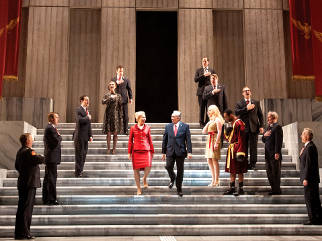
Munby's 1.2 presents a political rally with a looming Caesar for All advertisement hanging high upstage, flanked by red banners that unfurl to the stage. David Darlow's smiling face as Caesar graces the ad - CaesarForAll.com - and martial music plays as swarms of politicos in black suits with white shirts and ties rush up and down the marble steps. The crowd eases to the edges of the stage from within the audience, applauding as camera flashes pop and Darlow's Caesar appears amid the crowd, smiling and waving like any political candidate. He is joined by Marc Antony, who similarly moves within a crowd of handlers toward the stage, but Antony wears the attire of a professional boxer - trunks and boots and flashy satin robe - and he punches at the air with purple boxing gloves as if readying for a heavyweight title bout. Both Caesar and Antony are surrounded by Secret Service protection, menacing agents wearing sunglasses and cocking their heads to listen to earpieces. An all but extraneous Caphurnia follows, striking in a crimson leather power suit, and makes her way center stage.
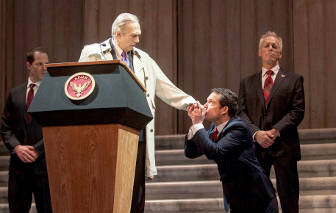
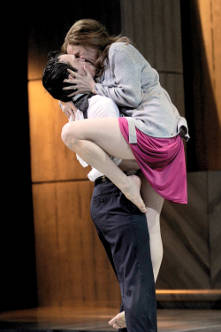
Following Caesar's cavalier dismissal of the mourning Soothsayer - "beware the ides of March!" - Munby moves into the play's three most introspective moments, but he diminishes the import of each with a calculated theatrical maneuver. First, Brutus and Cassius gather together 1.3, wearing dark suits and red power ties over white dress shirts. Brutus, the smaller and more focused of the two, looks worriedly offstage while the taller Cassius seethes and spouts anti-Caesar vitriol. Further, Cassius moves close to Brutus and seems to linger over him, clearly indicating a less-than-subtle and apparently unrequited homoerotic attraction. Cassius's motivation then comes into question, overshadowing Brutus's moral tug-of-war with his own conscience. Second, when Larry Yando's urbane Casca arrives to further foment the brewing rebellion, his impact on Brutus's turmoil is minimized by his grandly showing the two men a camera-phone video of Caesar failing to swim and requiring rescue. The comic modern tech-moment earns a chuckle from the audience. Finally, in 2.1, Brutus is left alone with his thoughts and his misgivings, but instead of a tortured inner monologue, John Light's Brutus makes a showy dunking of his head into an ostentatious mid-stage pool, swinging his head back so his hair splashes much of the stage behind him. Further, when Portia implores him to share his thoughts, she reveals a bloody gash high across her thigh. Light's Brutus wraps her in a carnal embrace and they passionately kiss within thunder and lightning effects, the typically introspective moment in this production hot with passion. Looking for the whispers of rebellion and the struggle of conscience, Munby's audience instead gets a homosexual attraction, camera-phone videos, an opulent pool of water, and a graphic thigh wound.
Munby's production benefits from a solid 3.1 assassination scene, preceded by Darlow's mutable Caesar in 2.2 bathrobe and furrowed expression, cradling a tumbler of Scotch: "tell them I will not come." Darlow's Caesar ultimately arrives amid Secret Service agents and stands at a podium to loud music, the scarlet banners behind him emblazoned with golden eagles. Yando's Casca makes the first knife attack from behind, and Caesar gamely tries to defend himself as he spins to center stage, but when he turns to face an assault from Light's hesitant Brutus - "et tu Brute? Then fall, Caesar" - he finally succumbs. Cassius goes too far, of course, lurching like a madman to yank the red banners from their moorings, shouting wildly about tyranny - "for freedom!" - and pumping his fist in the air. He is the first to join Brutus in the "stoop for blood" and he leads them all in raising his arms in sanguine victory.
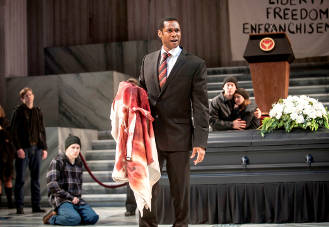
The best moments of this production lie within the alternating themes of loyalty versus righteousness following the assassination. With - supposedly - the abuse of power thwarted, Brutus and the assassins stalk the stage in their shirt sleeves, self-satisfied expressions on their faces, blood dripping from their fingers. When Dion Johnstone's Antony arrives 3.2, he appears like them in his dark business suit, but his bravery in confronting his friend's murderers is followed by grief, and Antony collapses when he sees the body of Darlow's Caesar at center stage, his trench coat torn and bloodied over him like a shroud. Antony, his tone scathingly ironic, moves from man to man and shakes hands, bloodying his own and leaving a scarlet handprint on one white shirt. He then watches the assassins exit, and he moves slowly downstage last, bringing intermission.
Munby continues with the pivotal 3.2 after intermission, maintaining an ironic tone as the politicians take turns manipulating the masses. The stage seethes with the plebeians, angry about something, outraged about anything, and they begin to roar but Light's Brutus quiets them as he makes his way - "as he was ambitious, I slew him" - to a presidential podium upstage. His tone is explanatory and calming as he shows the crowd his still-bloody hands, then has Caesar's ornate casket wheeled onstage, surrounded with overflowing bouquets of mourning flowers. The crowd slowly turns and begins chanting Brutus's name, and when he shakes Antony's hand - first preventing the mob from mauling the pro-Caesar politician - he exits with the roots of the revolution and the assassination fully explained. But Johnstone's fiery Antony has the last word, first enticing the rabble with the prospect of a will, then tantalizing them with a glimpse of the document, and finally enraging them against the conspirators with his reading of it. The moment is the high point of the production, a delicious insight into mob mentality, and Munby punctuates it with the ominous 3.3 brutalizing of Cinna, the traveling poet with the unfortunate name. Surrounded by roving bandits impelled by Johnstone's Antony, Cinna moves upstage in fear of rabble brandishing a switchblade knife, a long lead pipe, and a baseball bat, only to be garroted from behind and muscled offstage right. The muggers turn and flee to the sound of a squad car siren, a spinning blue light flashing across the upstage columns as the police "approach."
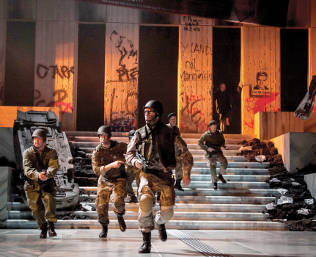
The fourth-act war scenes are staged with imagination and style, modern and frighteningly realistic, and one wishes Munby had imbued some of the conspiracy and soul-searching earlier with the same imaginative sense. In 4.1 Johnstone's Antony, attired in camouflage military gear and clothing, commands an interview room filled with black-and-white flat-screen surveillance monitors, calmly sitting to mark the names of those who are to be executed for treason. Octavius joins him, played as a stammering young fresh-faced kid with blond hair, blue eyes and a hesitant approach.
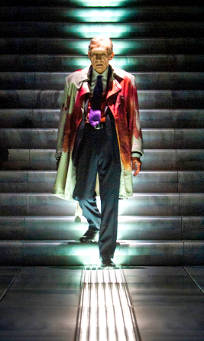
Brutus and Cassius confront each other in the field 4.3, after the set is changed among the noise of helicopters passing overhead, upstage rumbles of orange-flashing explosions, and distant machinegun-fire. Floodlights swirl and probe the marble steps, and chunks of stone fly as gunfire rakes the columns high upstage. After some odd moments - outside guards are invited into the command tent but compete for space to sleep; Cassius fumes like a housewife jealous of exclusion from her husband's work activities; an almost casual mention of the passing of Portia - the lights fade one by one, slowly, as if by a ghost's hand, frightening Light's Brutus, who scurries in terror about the stage. Finally, Darlow's Caesar appears as a ghost between two columns, ashen but wearing the rent and bloodied trench coat, and he moves slowly downstage, cursing Brutus and the conspirators as he exits and passes among the audience.
Munby's 5.1 finds the staircase and marble columns ravaged and literally smoking. Lights come up to martial drumming, and an overturned automobile can be seen on the stairs stage right amid ashes and rubble, the stairs themselves pocked with bullet holes and blackened by bomb blasts. The columns are scrawled with red spray paint graffiti, "pig" scrawled across Caesar's advertisement banner. Caesar's visage is disfigured with paint, red devil ears atop his head. Civilians mill around onstage like war refugees but as sirens wail and commandos dramatically rappel in from the fly - must be forty feet - to unbuckle and fire assault rifles, they flee in shouting terror.
After Cassius's battlefield suicide - he tells Caesar's ghost, "thou art revenged," as he falls and dies - Light's Brutus moves sadly downstage, and after turning toward Darlow's ghostly Caesar, impales himself and falls to his side. Johnstone's Antony removes his sunglasses and speaks kindly of Brutus - "the noblest Roman of them all" - before facing another crisis of violence. Octavius Ceasar, no longer the hesitant fair-haired boy, strides onstage and executes three kneeling prisoners of war with echoingly-loud rapid pistol shots, and Munby's production ends on a startling - if not fully realized - threat of a more real tyranny.